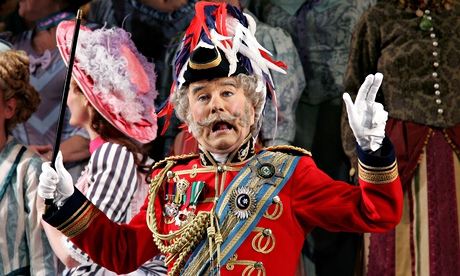When I was a teenager in the 1970s, living above my parent’s sweetshop in Brighton, a terrible thing happened. I developed an obsession, a dark craving that threatened to derail my happy family home. My school work suffered, I found myself unable to sleep, and my poor parents feared for my sanity. Social services were even mentioned. The diagnosis, at least, was simple. I’d become addicted to Gilbert and Sullivan.
The gateway drug, if such there be, was an encounter with their operetta The Yeomen of The Guard; for it was here on Tower Green, among the Beefeaters, that my epiphany occurred. It may have been merely a homespun production at my boys’ secondary school, yet despite the wobbling scenery, the female roles played by first-formers with improbable bosoms and an orchestra resembling a sackful of traumatised cats, I was captivated by this perfect synthesis of drama, comedy and unforgettable melodies. There was even a promised live execution. What more could a boy want?
Within weeks of this life-changing encounter I knew all 13 “Savoy operas” (so titled after the London theatre most closely associated with their world premieres) by heart. I sated my urge to perform in them by forming my own Gilbert and Sullivan concert group with other afflicted souls from my peer group, while my evenings were spent travelling to see amateur productions of Ruddigore or The Mikado in far-flung corners of the county. And when I had sufficient funds, my precious savings went not on drink, drugs or girlfriends, but on trips up to London to worship at the shrine of the D’Oyly Carte Opera Company, keepers of the Savoy flame, at their home in Sadler’s Wells.
Fifty years on and while my passion may have moved on to Verdi and Puccini, and the name of D’Oyly Carte is now little more than an occasional answer on Mastermind, I have WS Gilbert and Arthur Sullivan to thank for igniting my love of classical music in general, and grand opera in particular. And yet I still find myself occasionally having to defend their reputation. “All that tiddle-om-pom-pom stuff,” say sneering detractors of this very English art form; a classical music professional – and choral specialist – admitted to me recently that he’d “never really considered them”. That’s his loss. There’s so much more to Gilbert and Sullivan than whimsical stories and hummable ditties. As with all alchemy, it’s the suffusion of two disparate elements that transforms into something special. Gilbert may not have been an outstanding dramatist, and Sullivan may have been some way beneath Mozart or Beethoven as a composer; but mix them together and the result is pure gold.
Inevitably critics of these bastions of Victorian propriety will question the relevance of the Savoy operas in modern, multicultural Britain. Are they not merely smug, silly relics of a far-off imperial age, especially since their original brilliance has been dulled by decades of often-threadbare amateur productions, slavishly adhering to the D’Oyly Carte template without question, criticism or inspiration?
But they miss the point, for Gilbert’s barbed satire and Sullivan’s glorious pastiches have always been joyously seditious. The blinkered certainties of the class system are deftly lampooned in works such as Iolanthe and HMS Pinafore, the absurdities of cultural and political trends are revealed in all their transient folly in Patience and The Gondoliers, while the aspirations of Great Britain as a global superpower has never been more deftly skewered than in their penultimate work, Utopia, Limited. If the operas illuminate how we still like to see ourselves, it’s in a distinctly bilious yellow. All they need is for the crusted layers of stale tradition to be scraped away for them to shine once more in all their original glory.
Yeomen is surely their most human and richly textured work. By the time it was written in 1888, the musical world’s most famous partnership was at the height of its powers; yet creative tensions that had been kept at bay through long years of success were now surfacing. Sullivan, whose soul yearned to be given a libretto that could serve his more expansive musical pretensions, pleaded for something more than satire and absurdity. Gilbert responded by forsaking his normal taste for topsy-turvy by penning a piece rooted in real life, real characters, and with real human emotion. The result was not only Gilbert’s most nuanced dramaturgy, but some of Sullivan’s greatest music. Libretto and score are perfectly blended into an operetta that by turns amuses, chills and tugs at the heartstrings.
But there’s no need to take my word for it. No less a lyricist than the great Johnny Mercer once wrote “We all come from Gilbert”, while Sullivan’s influence has been acknowledged by composers from Noël Coward and Ivor Novello through to Stephen Sondheim and Andrew Lloyd Webber. You can find their words and music embedded in every layer of popular culture, from episodes of The Simpsons through to The West Wing; while even Lin-Manuel Miranda’s 2015 smash hit musical Hamilton contains a reference to “A modern Major General”.
• English National Opera’s new production The Yeomen of the Guard opens on 3 November at the London Coliseum.











